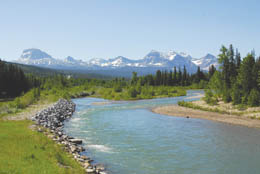
The openness of our legal system is especially important in this case. The plaintiff, now calling itself the Public Lands/Water Access Association (PLWA), challenges the legality of Madison County’s resolution to permit James Kennedy, a landowner from Georgia, to attach a private wood rail fence to a bridge across the Ruby River.
Beyond the legal technicalities, this case is about the rights of a private landowner to limit access to his property. PLWA portrays itself as David—a local, citizen sportsmen group—against Goliath—a wealthy, out-of-state landowner. In fact, this is a long-standing campaign by the association, dressed up in public interest clothing, to gain access to waterways across the state even if access means trespassing. Since the stream access judicial and legislative battles began in the 1980s, the question has been whether public access constitutes a taking of private property rights without compensation.
Secure private property rights are the bulwark of equality and justice in the United States. The blindfolded statue of Lady Justice holding her balance symbolizes our rule of law. Ours is not justice for hunters versus bird watchers, poor versus rich, or Montanans versus Georgians; it is “justice for all.”
Moreover, private ownership is the key to good resource stewardship, something we all want to encourage. Put it this way, no one washes a rental car—except the rental car company. Across Montana, private landowners provide habitat for big game, birds, fish, and plants, and open spaces that we call Big Sky Country. With 66 percent of all Montana land and an even greater percentage of riparian land under private ownership, no one, not even members of PLWA, doubts that private owners provide fish and wildlife habitat, which benefits all of us.
Lest you doubt the pernicious effect that taking property has on habitat, consider what happened when the Bitterroot River Protective Association (BRPA) led the battle to access the Mitchell Slough, again pitting local, citizen sportsmen against rich, out-of-state landowners. The privately reclaimed waterway, once a ditch, was managed for both fish and irrigation. Because it became such a good fishery, it attracted the attention of the BRPA, which challenged the rights of landowners to restrict public access.
After the BRPA won its access challenge in the Montana Supreme Court, ditch owners stopped managing for fish and now manage primarily for irrigation. With the headgate shut in winter months, the upper portion has very little water and the lower portion is increasingly silted in. Yes, BRPA “won” the right to access the public’s water by walking on the privately owned beds and banks of the ditch, but the fish habitat that private owners created is disappearing.
The great conservationist, Aldo Leopold, underscored the importance of a “land ethic,” but he also understood incentives. As he put it, “Conservation will ultimately boil down to rewarding the private landowner who conserves the public interest.” Or rephrased in the context of stream access, habitat destruction will result if we penalize the landowner by taking his or her private property without due process and just compensation.
After co-authoring a “friend-of-the court brief” in the Madison County case, I received an unfriendly note telling me to “leave the public’s stream access law alone. This is Montana not Atlanta and we treasure our Treasure State.” As a native, citizen, homeowner, and sportsman of Montana, I do treasure our Treasure State, which is precisely why I hold the constitutional protection of private property in the highest regard. Without it, our economic and environmental treasures are in jeopardy. May justice prevail on April 29.
Terry Anderson is president of PERC in Bozeman, MT, and a senior fellow at the Hoover Institution at Stanford University.
For more information, read PERC’s amicus brief or stream access position statement.



